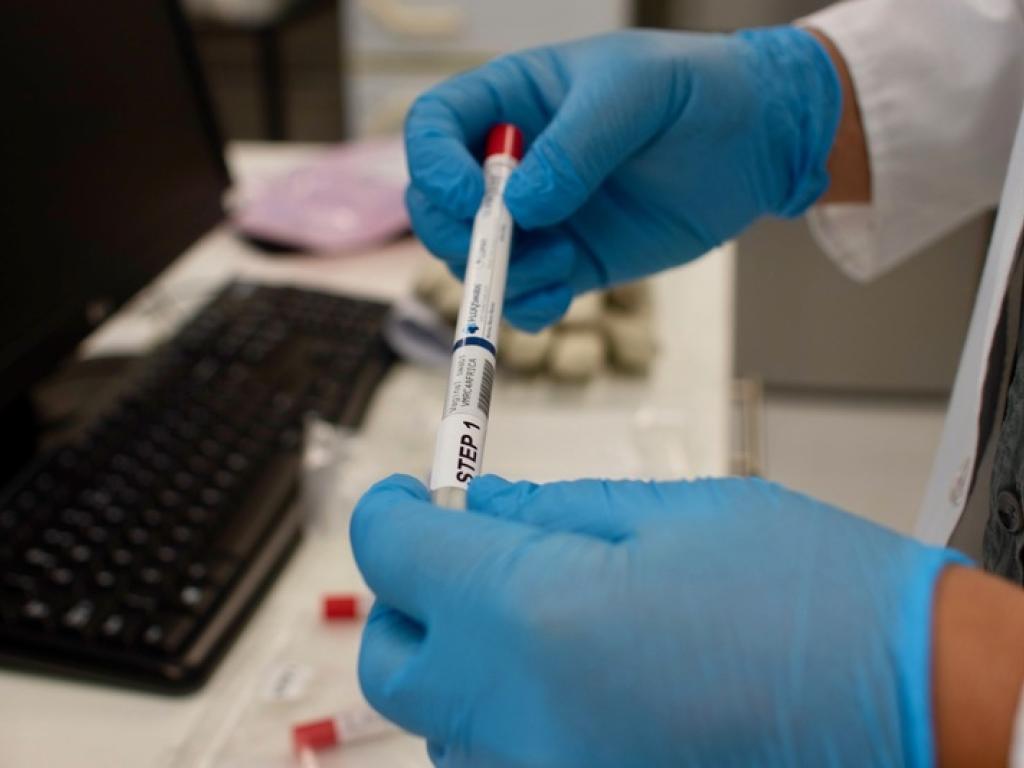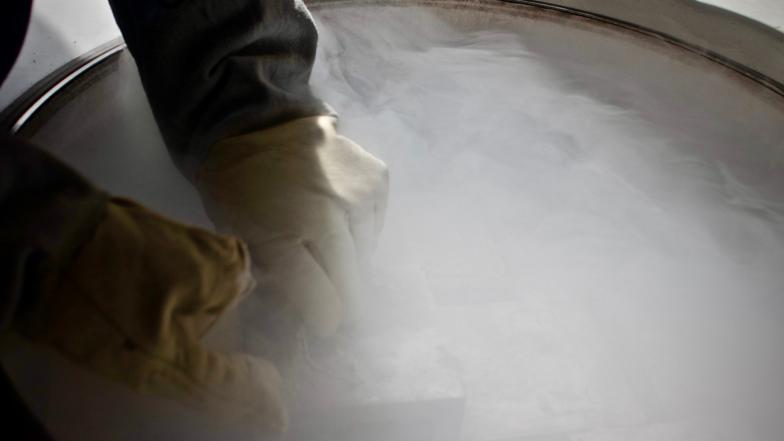Safeguarding samples: The science behind a cutting-edge biorepository

GIFT repository manager, Yacoeb Ganief, holds a vaginal swab from a study participant collection pack. Over the course of this study, each participant will provide several samples to be stored and catalogued at the GIFT repository.
In sub-Saharan Africa, women face a disproportionate sexual reproductive disease burden, with an elevated risk of HIV, cervical cancer and birth complications. At the same time, a lack of health data in the region hampers adequate healthcare provision. Laboratory biorepositories like the GIFT repository at the University of Cape Town (UCT) serve as hubs of health data to inform local healthcare interventions with global relevance.
Housed on UCT’s medical campus, the GIFT biorepository stores hundreds of thousands of consensually-collected biological specimens, including vaginal swabs and other genital tract specimens. The biorepository is the engine behind the development of GIFT, a novel genital inflammation test whose distribution could revolutionise women’s access to sexual and reproductive healthcare screening.
Usually, asymptomatic sexually transmitted infections (STIs) go untreated. By self-testing for the tell-tale signs of genital inflammation, women can access treatment and protect against an increased risk of HIV, pelvic inflammatory disease, infertility, and pregnancy complications. To refine the test, the primarily-female research team is conducting research involving nearly one thousand women from South Africa, Zimbabwe and Madagascar who have volunteered to provide vaginal swabs for the study. These precious samples must be carefully preserved and stored so the research team can test them for inflammation markers, STIs, or bacterial vaginosis (BV).
Yacoeb Ganief, the GIFT repository manager, oversees the GIFT biorepository, where samples from this and other reproductive health studies are stored and monitored. "We need to keep study participants' samples safe and well-maintained for five years after a study," he explained.
Antarctic storage temperatures safeguard the samples from degradation, meticulous protocols prevent human error, and secure software blocks unauthorised access to data.
Optimum chill
Inside the three-roomed biorepository, large ultralow freezers contain rows of barcoded tubes packed neatly into clearly labelled boxes. The fridges are set at -80 °C, a temperature that protects the integrity of the samples by preventing degradation of the biological components.

The researchers can more easily process and revive living vaginal bacteria for testing at this temperature, Ganief said. In another room, liquid nitrogen cylinders are used for even more sensitive biological samples such as human cells and cell lines.
The biorepository must be temperature-controlled to ensure the ultralow freezers operate optimally. A constant cold stream of air counterbalances the heat that the freezers emit, keeping the room at a stable 21 °C. Temperature displays flash red on the refrigerator doors – a reminder that the samples remain viable only within a particular temperature range.
"You don't want temperature fluctuations," he said. If the temperature increases beyond a point, an alarm system immediately notifies an on-call member of the GIFT repository team.
According to Ganief interruptions like load-shedding can be devastating to repositories. To guard against these in sample access, the team were quick to invest in new freezer technology that can maintain critical temperatures. “For example, it has built-in back-ups that allow you to send signals you can monitor," he said.
The Institute of Infectious Diseases and Molecular Medicine (IDM), where the GIFT team and shared biorepository at UCT are based, have also installed generators the team rely on during power outages. Tight protocols are in place that ensure that the team responds swiftly to any power interruptions to the facility.
“We have implemented effective procedures to manage sample life spans and availability,” Yacoeb said. “Identifying samples and protecting the life integrity of the samples are of utmost importance."
A wealth of health data
Mirroring the physical biorepository is an extensive online biorepository.
"Each sample has a string of data associated with it, which is based on the data system,” said Ganief. The GIFT team uses a laboratory information management system (LIMS) called Freezerworks, centralised software designed to manage and track laboratory samples and associated data. "We're basically creating an electronic database [in addition to the physical biorepository], where we can monitor the samples’ location and lifespans."
At the start of a study, potential participants receive informed consent forms outlining the sample plan and possible future usage. “The form includes questions like, ‘Do you agree to have your samples tested for ABC?’, whether that’s STIs, HIV or BV," he explained.
In some instances, the researchers may request to keep samples for future studies spanning five or ten years, depending on the approval of the university’s ethics committee and in agreement with the participants.
"Region by region, [the consent rate] differs," he said. The researchers account for this variability in the study design to ensure both adequate sample sizes and strict adherence to participants' wishes. Over the course of studies like the GIFT, researchers collect thousands of samples – a wealth of local and regional sexual and reproductive health data.
Once the team has collected the samples from the study site, the team ‘de-identifies’ them, labelling each person’s samples with a unique identifier to protect participants’ identities.
"The process/nomenclature of these identifiers is decided before the study begins," he said. As soon as the samples arrive at the repository, the team checks the shipping conditions, monitors temperatures, and performs quality control. Depending on how much tissue is collected, a single swab can yield thousands of smaller samples or ‘sub aliquots’. When the research team is ready to analyse samples, the team uses the LIMS to identify and retrieve them within minutes, while maintaining sample integrity.
With the GIFT study now in the final phases, his team is looking forward to using its state-of-the-art infrastructure to unlock future collaborations and advancements in locally relevant sexual and reproductive health research. A leading regional biorepository facility, the GIFT team is committed to "ensuring samples collected in Africa remain in Africa according to international best practices, benefiting African research".
